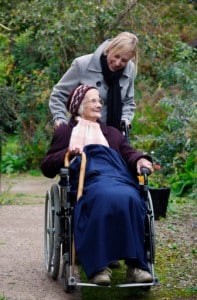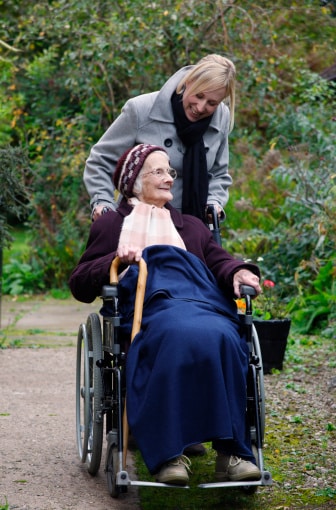 Taking on the role of primary caregiver can be difficult. According to an article on Yahoo Voices, the “sandwich generation,” a group of people who are taking care of both their own children and their aging parents, is growing. The growth of the number of middle-aged people with older adult parents and the rising costs of health care and long-term care make it more and more common that these adults become their parents’ primary caregiver. This can present many issues that neither caregiver nor parent typically expect.
Taking on the role of primary caregiver can be difficult. According to an article on Yahoo Voices, the “sandwich generation,” a group of people who are taking care of both their own children and their aging parents, is growing. The growth of the number of middle-aged people with older adult parents and the rising costs of health care and long-term care make it more and more common that these adults become their parents’ primary caregiver. This can present many issues that neither caregiver nor parent typically expect.
The Challenges of Caring for an Older Parent
The Yahoo article points out some of the common issues that arise in these circumstances: loss of personal identity, role reversals, feelings of loneliness and guilt, legal decisions and paperwork, stress, and marital and family conflicts.
For an adult trying to balance the care of an older parent as well as that of their children, it’s not uncommon that the first thing they will sacrifice is their own personal needs. This happens when the caretaker starts to feel some loss of their identity because they are so focused on the needs of their loved ones that they aren’t taking time for themselves.
Role reversal also presents challenges for both the caregiver and the parent. It can be uncomfortable and embarrassing for both parties that the parent now needs to be taken care of in a way that had never happened before. In situations like this, it’s important that the caregiver remember to treat the older parent with the utmost respect and continue to consult them on decisions related to their care.
Taking on such a stressful and taxing role can bring up a whole slew of emotions for the caregiver. Because the task of caring for an aging parent can be so demanding, feelings of loneliness and guilt can arise. It’s important for the adult child to know that they are not experiencing anything uncommon and that their mixed feelings about the situation are normal.
Along with mixed feelings and stress, the caregiver may have to deal with legal decisions, such as last will and testaments, power of attorney and more. This can cause friction, not only between parent and child, but also between siblings and other family members. In fact, the whole situation can cause conflicts in a caregiver’s marriage and family. The dynamic of the family will have changed significantly, and this can be difficult for all parties involved.
Taking all of these factors into consideration, self care for caregivers of older parents is essential. Just as anyone with a stressful job or other emotionally taxing responsibility needs to take time to focus on themselves, caregivers also need to do this. If they don’t, they are running the risk of burnout, depression or severe feelings of resentment and frustration.
Tips for Self Care
- Schedule time for yourself – It may feel strange to have to pencil in time for yourself, but if you don’t do it, you may never actually get that “you time” that you desperately need. Make sure that you make time for yourself on a regular basis to do the things that bring you joy.
- Ask for help – Part of providing good care for your parent will be learning how to ask for help and to delegate aspects of their care. You can’t take on everything alone, so don’t be afraid to go to siblings or even a nurse or social worker for help.
- Seek support – You need to find a support system that will help you get through this time in your life. Don’t hesitate to ask family and friends for emotional support. Some caregivers also find comfort in caregiver support groups, where they can talk with others who can relate to what they’re going through. Finally, meeting with a counselor or therapist is also a good way to find the support that you need.
- Hire outside help – Professional care for your older parent might be out of your budget, but if you are able to hire outside help for other chores, such as house cleaning or grocery shopping, that can be a good way to take some of the responsibilities off of your plate.
- Take care of yourself – Pay attention to signs of burnout and depression and seek help or assistance if you need it. Exercising and eating healthy are both important ways to help you feel your best during this difficult time.
Caring for an aging parent, whether by yourself or with your entire family, is a trying experience. It demands the most of you, so you’ve got to ensure that you’re up to it, and there’s no better way to keep yourself ready, willing and able than to care for yourself while you care for your parent.
Gabriela D. Acosta works in community outreach for two University of Southern California programs, the online teaching degree and online masters degree in social work. She is passionate about social justice, community organizing and leadership development. Connect with her on Twitter @Gabyacosta101















